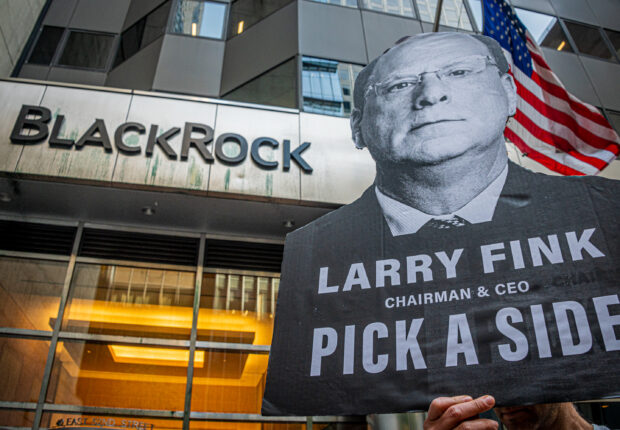The world’s biggest money manager lost big for investors, yet it continues to ignore the financial risk of putting money into fossil fuel companies.
There’s a new detailed report out today from analysts at the Institute for Energy Economics and Financial Analysis (IEEFA) and it’s a doozy. The report shows that BlackRock continues to ignore the serious financial risks of putting money into fossil fuel-dependent companies.
Why this is important: Given that BlackRock is the world’s largest asset manager, it has a tremendous responsibility and opportunity to be a leader on managing climate risk. But right now, the report shows that company is still a laggard on all fronts when it comes to sustainable finance.
What’s new: The report, entitled Inaction is BlackRock’s Biggest Risk During the Energy Transition, puts a price tag on BlackRock’s investment decisions, calculating that the company’s refusal to address risk has lost investors over US$90 billion in value destruction and opportunity cost in just a select few fossil fuel-heavy holdings over the past decade (all data as of March 31st, 2019).
More report highlights:
- Out of BlackRock’s US$90 billion of losses, 75% are due to its investments in four companies alone – ExxonMobil, Chevron, Royal Dutch Shell and BP – which have all underperformed the market in the past decade. Other big losses have occurred from large coal bankruptcies over the past decade.
- Despite public announcements highlighting its commitment to sustainable investments, only 0.8% of Blackrock’s total portfolio is invested in environmental, social and governance (ESG) oriented funds.
- BlackRock consistently says it has little control over its US$4.3 trillion passively managed portfolio. Yet other large asset actors such as Amundi, Norges Bank, AP4, Storebrand and KLP have all developed low carbon investing strategies, with Amundi recently phasing out coal companies and utilities in both its active and passively managed investments.
- BlackRock’s Board of Directors has a number of conflicts of interest, with six out of 18 board members having worked in companies with strong ties to the fossil fuel sector. Furthermore, while Blackrock’s governance team advocates for a separation of the Chair and Chief Executive Officer positions, Larry Fink still holds both roles in the firm.
- In 2018, Ceres calculated that BlackRock supported just 10% of climate-related shareholder proposals in the U.S., choosing to side with management in the majority of cases, and in multiple cases, providing the decision votes that killed climate shareholder resolutions. IEEFA also notes BlackRock does not disclose the results of its engagement with companies over ESG topics.
The big picture: As this campaign has been saying for months, BlackRock’s CEO Larry Fink is not walking the talk when it comes to action on climate change, and given BlackRock’s size and power, this is a significant problem for climate action in the entire financial sector.
BlackRock manages more investments in the companies creating climate pollution than any other asset manager on the planet. The company also manages more money than the GDP of Japan, the third largest economy in the world. If BlackRock can begin to shift its investments and influence, we expect other large asset managers like Vanguard and State Street to follow.
What can BlackRock do now: This report is pretty damning, and BlackRock should do a number of things to improve its climate record. We think these are the most important first steps:
- Begin to shift capital out of the coal economy, starting with its actively managed products. BlackRock has said, “coal is dead”, but the company remains the world’s largest equities and debt investor in coal companies and coal-heavy utilities. Many global asset managers are divesting from coal in all actively managed products, using the Global Coal Exit List to guide this transition. BlackRock should join them.
- Make all ESG products coal free, world wide. It is always surprising to see ESG funds littered with fossil fuel companies, and we’ve shown that BlackRock’s ESG products are chock full of the companies driving climate change. But in Europe, BlackRock’s latest ESG products are free of thermal coal. Sustainability is universal; BlackRock shouldn’t have one set of criteria for what’s sustainable in Europe and a different one in other places around the globe.
- Offer fossil free products as default, lead investment vehicles for its clients. Last year the NYC comptroller’s office, a BlackRock customer that manages five pension funds worth almost $200B, made news when it decided to divest from fossil fuels. If BlackRock wants to keep this business relationship it will have to make a portfolio of fossil free investment options for NYC. It should offer these investments as default options to other customers as well. Better (or equal) financial returns, better for the climate.
- Vote for Climate Action: BlackRock excuses its investments in fossil fuels by touting its robust shareholder engagement team. Yet the company is not making progress with most fossil fuel companies and routinely votes with management and against key climate shareholder resolutions, year after year. Given BlackRock’s size, the company, along with Vanguard, is often the deciding factor of whether these resolutions succeed or fail. BlackRock must change its engagement approach and vote for key climate resolutions.
More information:
- Download the full report here.
- See the press release from IEEFA here.
Media coverage:
- Financial Times: BlackRock lambasted over wasteful fossil fuel investments
- Guardian: BlackRock lost $90bn investing in fossil fuel companies, report finds
- Business Insider
- Responsible Investor
- The Weekend Leader
- Share Cast
- E&E News
- IPE
- There were also global stories in Bloomberg HT (Turkey), Moneylife.in (India), Duurzaam Bedrijfsleven (Netherlands), Merca 20 (Spain), Green Economy (Italy), Business Insider (Italy), E Daily (Korea) and a second story in E Daily (Korea)

